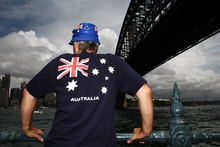Nov 30, 2013

Tony Abbott’s new Australian Government has put New Zealand on the formal invitation list for next year’s meeting of the powerful G20 in Brisbane
It is an extraordinary honour for a small country like New Zealand which is not itself of significant size or influence to be anywhere near being granted G20 status in its own right.
But Abbott will ensure that the New Zealand Prime Minister (whether it is John Key or David Cunliffe if the Government does change before the mid-November G20 meeting) is present to rub shoulders with the world’s most powerful leaders, such as America’s Barack Obama and Germany’s Angela Merkel, in what is undoubtedly the highest ranked global governance forum outside the G8.
As Australian Foreign Minister Julie Bishop puts it: “Australia will flex its muscle and invite the right countries into the G20.”
Australia’s decision to bring New Zealand into the fold is the upshot of painstaking diplomacy over several years. For instance, Mexico in its host period as G20 leader invited Trade Minister Tim Groser to play a pivotal role in the economic debate.
But it is also proof of the high ranking that Australia now extends New Zealand after a period in which, as Abbott administration cabinet ministers openly acknowledged this week, New Zealand drew ahead of Australia on several important economic policy fronts.
Australian Treasurer Joe Hockey made this abundantly clear at the annual Australia New Zealand Leadership Forum in Sydney on Wednesday.
An invitation will be in the mail for New Zealand – and possibly also Singapore – to join the G20 nations’ leaders in Brisbane during Australia’s host year to provide new perspectives in the economic debate.
The transtasman leadership forum is an annual gathering of Australasian powerbrokers ranging from political leaders and bureaucrats to business people.
Hockey – like Julie Bishop earlier in the forum – suggested that having New Zealand at the table will bolster Australia’s case to have the G20 focus on major issues on the trade and investment front.
It was apparent that there was little confidence that the World Trade Organisation will manage to get the global trading round moving forward again in the short-term after a decade of stasis.
Groser can be expected to perform an influential interlocutory role if trade is added to the G20’s agenda as Australia wants.
The most striking aspect of the 2013 leadership forum was the open admiration expressed by Australian Liberal ministers over the moves John Key’s Cabinet has taken since the financial crisis. Hockey singled out the tax switch where Finance Minister Bill English hiked GST to pay for income tax reductions. Said Hockey, although “not heroic”, it was “significant”.
There was more besides.
Bishop approved of Foreign Affairs Minister Murray McCully’s decision to bring external aid into the Ministry of Foreign Affairs and Trade (MFAT). It is a step which Bishop is mirroring in Australia where aid is being brought within the Australian Department of Foreign Affairs and Trade (DFAT), along with tourism.
McCully refers to this as the “new orthodoxy”. In New Zealand he initially took a pasting from foreign affairs stalwarts over his temerity in refocusing MFAT in a new direction paving the way for New Zealand to achieve its economic aims – particularly with international trade.
But Bishop also reckons economic diplomacy is the name of the game in the 21st century. Australia now has a strong focus on its foreign policy assets, which she believes are unmistakably within its own region – the Indian Ocean through to Asia-Pacific.
The leadership forum focused on the Asia-Pacific and how both Australia and New Zealand could become “Asia-fit” . But it was also clear that both countries are deeply engaged on a range of issues including disaster relief, banking, investment, education, defence, intelligence and security.
The new Australian Government faces some huge challenges.
For decades, Australia has basked in the reputation of being the “Lucky Country”, showing an extraordinarily optimistic face to the world.
It is blessed with wide-open spaces, sunshine and enormous mineral wealth.
But Australia’s finances are under pressure as the drop in value of mineral exports affects the tax take.
It is clear the new Australian Government is grappling with some significant policy challenges.
Hockey described these challenges as “sobering”. Currently 73 per cent of the Australian Budget goes on what loosely might be called social services. This goes to 78 per cent within five to 10 years. He said it would require Australia to double its productivity rate to twice the level of the historical average to simply maintain the quality of life over the next 10 years that Australians have previously enjoyed.
This presents both a challenge and an opportunity for New Zealand.
There is clearly a risk that if Australia takes an economic bath – however slow – that New Zealand will suffer.
But there is also a message there that keeping New Zealand focused on its own ends – rather than getting angst-ridden over Australia’s better historic performance – will help to ensure this country gets to enjoy “lucky country” status over time.
